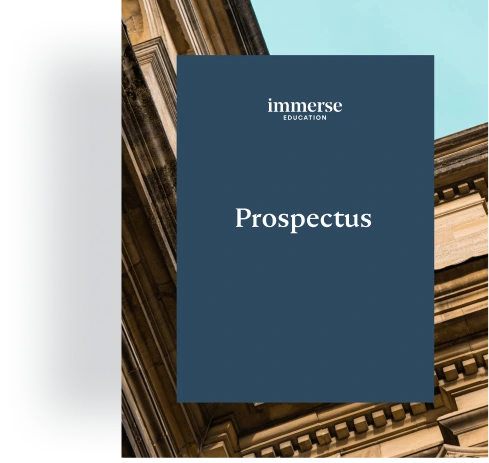Struggling to write your personal statement? You’re not alone! Most students struggle with this part of the application process. But you don’t have to be one of them.
We know how important it is for you to stand out from other applicants, and we want to make sure that happens. Follow these guidelines for writing a solid personal statement that will help you get into your desired University! If you want to jump to a specific guide, check out below:
- How to end a personal statement
- How to write a law personal statement
- How to write a medical personal statement
- How to start a personal statement
- What not to put in a personal statement
- Personal statement work experience
Save this infographic for future use as it contains all the tips in this article:
What Is A Personal Statement?
A personal statement is a short essay of 4,000 characters and 47 lines that you submit to the UCAS application portal along with your grades and references. They will then distribute your application across different universities or colleges that you have previously chosen.
You have to use your personal statement to demonstrate your interests, talents, and abilities. If you want to be an outstanding candidate, use these top tips to leave a lasting impression on the admissions tutor.
1) Answer These Starter Questions To Help Your First Draft
The most challenging part of writing is starting. Your hand freezes even before you get to type a single word because you’re not sure how to start.
But you don’t have to worry about writing yet because these questions will help kickstart your writing.
- Write down your “WHY.” Why do you want to study that specific course you’re applying for? What particular event in your life is relevant to the course?
- How did you learn about your chosen course of interest? Do you have family members or significant figures you admire who have related professions in the field?
- Read the course descriptions. What skills and experiences does the course demand?
- Which of these skills and experiences do you have? Where did you develop them? If you have any certifications, awards, or memberships to highlight your skills and experiences, much better! Doing so will help prove that you are a suitable applicant.
- What future career path are you looking to pursue? What are your goals? Stating your dreams and ambitions plainly and your motivations behind them demonstrates your sense of purpose.
- Did you experience difficulty during your education? If you experienced mental or physical health issues that affected your performance, it’s best to include them in your personal statement. Financial difficulties are also essential to point out.
- What are the characteristics you have that sets you apart from the other applicants? Why should the admissions committee consider you?
2) Start Freewriting!
After answering the questions stated above, you now have a solid idea of what it may take to write a good personal statement. Don’t worry about grammar, punctuation, and the 4,000-word count limit just yet. Let your ideas flow and start writing!
Remember, the whole point is to convince the reader that you are worth accepting into the University of your choice.
So imagine you’re talking to the school’s admission as you’re typing. Doing so keeps your mind’s eye centred on why you’re writing your personal statement in the first place.
3) Craft Your Personal Statement Into Your Personal Story
To make your personal statement stand out with free-flowing and attention-grabbing language, craft it into your personal story.
Begin by recounting a significant event in your life that kindled your interest in the course you’re applying for. Then continue the journey from there, pointing out essential details of your growth and development.
Not only will this approach keep the reader hooked, but it also establishes a personal connection with them. They’ll feel as if they know you as a person. Thus, increasing the chances of your admittance into the university.
4) Put Your Best Foot Forward
Once you have your long, messy draft ready, it’s time to clean and polish. The first order of business on how to write a personal statement is to put your best foot forward. Writing a personal statement is equivalent to selling yourself. Meaning you shouldn’t write about irrelevant experiences or skills.
When applying for Biology, don’t write about your achievements in debate championships. Concentrate on your scientific prowess.
Neither should you write about your weaknesses. You don’t have to write about your hatred of Calculus or your difficulty in learning French.
Go over your draft and remove paragraphs and sentences that are not in line with your course. Delete anything that devalues you.
You only have 4,000 words to sell yourself. Make it count!
5) List Achievements & Specific Details In Your Personal Statement
Proper nouns make your personal statement powerful. Saying you’re a member of the “debate association” is nothing compared to the “National Speech And Debate Association.”
Do you see the difference?
So insert specific details like dates and proper names as much as possible. Stating you won a “leadership award” is not as impactful as “the 2019 Youth Leadership Cup.”
Our guide on how to write about work experience in personal statements will have you typing in no time.
6) Proofread & Spell Check
After choosing which narrative should stay and which should go, you now have a shorter, more relevant draft in hand. The next step is to correct your spelling and grammar by proofreading it.
The easiest way to accomplish this is to run your document over in Grammarly. Grammarly is a free writing app that helps you communicate your ideas in a clear and effective way. The premium version leads you a step further, but the free version works fine.
Check out our handy guide on what NOT to put in a personal statement.

7) Make Your Sentences Concise And To The Point
Check your sentences to make them more concise and to the point.
Sentences with this structure, “I remembered when I was in middle school, I have been very interested in the complex systems of the human body,” can easily be compressed to “Since middle school, I have been interested in the complexity of the human body.”
Each year, universities have to read thousands of personal statements. Make yours effortless to read!
8) Choose Precise Words To Express Yourself
Some words are more powerful and expressive than others. Going with our previous example, instead of saying “I have been very interested,” why not say “I have been passionate”?
Change “think” to “believe.” “Improve” to “enhance.” You can see where we’re going with this. For easy suggestions, type the word you used in the google search bar. Then put in the word “synonyms” after it. Press enter, and voila! You have a list of potential words at your fingertips.
9) Make Your First Paragraph Stand Out
At this point, you should be comfortable with what personal statements are and how to write them from beginning to end.
Go back to the beginning and make sure it’s as compelling as it can be.
Focus your creative energy on your first paragraph as if that’s the only paragraph the admissions committee will ever read. Make it stand out!
If you don’t, chances are it is the only paragraph they’ll ever read!
We’ve also produced an in-depth guide on how to start a personal statement.
10) Read It Out Loud

You will never know how good your personal statement sounds until you read it out loud.
When you read it, does your tongue roll out the paragraphs smoothly? Or are there incoherent thoughts that don’t go well together?
When a document is difficult to read, you can bet it’s also difficult to understand. So read your personal statement several times and make the necessary revisions until it’s smooth as butter!
11) Let Someone Else Read It
Your personal statement is…you guessed it, very personal. What may be clear to you may not be clear to someone else. That’s why it’s vital to let someone else read it.
Show it to your classmates, teachers, and parents. You need their fresh eyes to examine your document. The more readers you have giving your feedback, the better your personal statement will be.
Receive their suggestions with grace and seriousness. You’ll need the trial run before submitting the final version!
12) Distance Yourself
After having gained feedback from several fresh eyes, it’s time to refresh yours. Put down your personal statement and go about your daily life. Forget about it for a while.
Let a few days pass before you return to it. Then read it out loud again. You’ll be surprised to notice characteristics you didn’t catch before. Edit out parts you dislike, improve others, and retain good portions.
Your personal statement will come out better!
13) Be Authentic
Stay true to who you are and show why you’re enthusiastic.
When learning how to write a personal statement, you don’t have to copy someone else’s. You are unique. Use your own voice and ideas. That’s why this article doesn’t have a rigid, point-A-to-point B structure for you to follow.
Another thing to keep in mind is honesty. Don’t put in skills you don’t have in your desire to impress. If you lie today, the university will find out later on.
Your goal is not only to make a good first impression but to make a lasting impression.
14) Give Yourself Time
You shouldn’t cram your way through your personal statement. Treat it as a work of art – intentional and soulful.
Your personal statement reflects who you are and why you deserve to be admitted into the University. It may take you a month or two to write your personal statement. And that’s perfectly fine! Remember, you will need to distance yourself from it for a few days to get a fresh perspective.
So start early and take your time!
15) End Your Personal Statement With A Summary
Writing the conclusion for your personal statement isn’t too difficult. You need to hit these three points:
- Summarise what you’ve mentioned in the main body of content
- Reiterate your ‘why’ and motivation for your degree choice
- Thank the reader for their time and
Why Do You Need A Personal Statement?
A UCAS personal statement allows you to showcase your qualifications, skills, and experiences, and explain why you fit well for your chosen university degree.
After submitting your personal statement to the UCAS portal, universities will be able to read it and understand why you stand out compared to other applicants. Everything from your writing skills to your qualifications and motivations for your degree is all under the magnifying glass.
How To Structure A Personal Statement?
We recommend using this structure for your personal statement as it’s flexible enough for you to include everything you need to:
- Introduction: Use this to hook the reader by providing information about yourself. For instance, use a relevant personal story or interesting hobby that relates to your degree choice.
- Body: Here is where you explain your interests in the degree, be specific and give examples, and why this course may help improve your career prospects. Try to include relevant skills or experiences, from coursework to internships.
- Conclusion: Summarise everything in your body and state why you are a strong candidate, try to show your appreciation and gratitude.
The key pattern you’ll see throughout is trying to relate all experiences back to the degree itself. Remember this when proofreading as it helps strip a lot of ‘fluff’
How Long Should A Personal Statement Be?
A personal statement can be a maximum of 4,000 characters or 47 lines of text in size 12 font.
Do You Need A Personal Statement If You Take A Gap Year?
Yes, you need a personal statement if you take a gap year. You should include information about your gap year in your personal statement, as it demonstrates how you have used your time productively and highlights any relevant skills or experiences that you have gained.
It also shows that you have been proactive and taken the initiative to gain experiences and skills that will be beneficial for your university studies.
Do You Have To Write Another Personal Statement For Clearing?
No, you do not need to write another personal statement if you’ve entered UCAS clearing. The original upload will be used so just make sure to stay responsive to any calls or emails.
How Long Does It Take To Write A Personal Statement?
We recommend a minimum of 4-6 weeks to write your personal statement. This is because you still have to juggle schoolwork and extracurricular activities at the same time.
Can You Write It In One Day?
No, you cannot write a personal statement in one day, especially if this includes proofreading and editing. As we mentioned, you should spend a minimum of 4-6 weeks and ideally longer to craft a memorable statement.
Can You Use Slang Words In A Personal Statement?
No, you should not use slang words in your personal statement. If there is a quote you are using and the quote contains slang, then yes you can – but only in those circumstances.
What Tense Should You Use In A Personal Statement?
You can use any tense, however, we recommend using the present tense as it helps the reader feel like they were there with you when you write about your experiences and your enthusiasm for the degree.
Do You Feel More Confident To Start Writing?
Your personal statement is an opportunity for you to express your passion and individuality.
Follow these tips for writing an effective and articulate personal statement that the admissions officers can’t resist reading all the way through.



